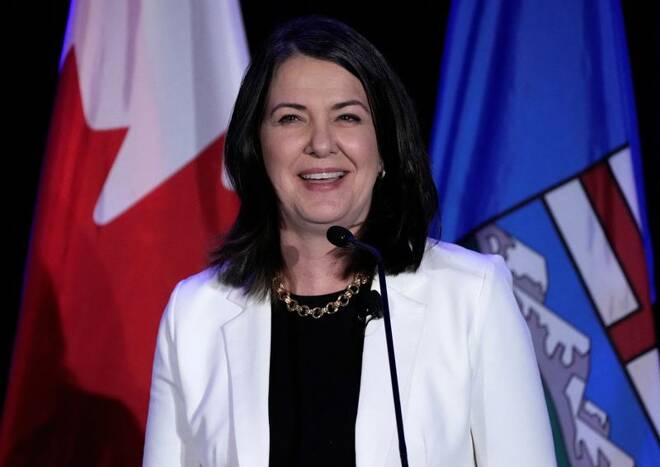Advertisement
Advertisement
Alberta Premier Danielle Smith seeks more sovereignty from Canada in new bill
By:
By Nia Williams (Reuters) - The government of Canada's main oil-producing province Alberta introduced proposed legislation on Tuesday to resist federal laws it deems harmful to Alberta, fulfilling a controversial promise from new Premier Danielle Smith.
By Nia Williams
(Reuters) -The government of Canada’s main oil-producing province Alberta introduced proposed legislation on Tuesday to resist federal laws it deems harmful to Alberta, fulfilling a controversial promise from new Premier Danielle Smith.
If passed, the bill, known as the Alberta Sovereignty Within a United Canada Act, would give the province a legislative framework to defend its jurisdiction in areas such as natural resources, gun control, and health and education.
It would also enable Alberta to refuse to enact federal laws that are “unconstitutional or harmful” to the province, the government said in a statement.
However, the act will not allow Alberta to ignore court orders or do anything that contravenes the Canadian constitution, and is not meant to be a precursor to Alberta separating from the rest of Canada, the government added.
“We have the power to reset the relationship with Ottawa, that’s what this is,” Smith told a news conference. “I hope that we’ve sent a message to Ottawa that we will vigorously defend our constitutional areas of jurisdiction, and they should just butt out.”
Alberta has long had a strained relationship with Prime Minister Justin Trudeau’s Liberal government in Ottawa, stemming from a sense that the federal government’s climate polices are damaging Canada’s oil and gas industry.
Smith highlighted federal government plans to cut carbon emissions from fertilizer and oil and gas sector as two examples of climate policies that would be “very problematic” for Alberta.
Introducing a Sovereignty Act was a flagship promise in Smith’s successful United Conservative Party (UCP) leadership bid that appealed to right-wing Albertans, particularly in rural areas. The bill is expected to become law because the UCP have a majority in Alberta’s legislative assembly.
Trudeau avoided commenting directly on the Sovereignty Act when asked by reporters on Tuesday.
“I’m just going to stay focused on the things that matter to Albertans whether it’s affordability, whether it’s creating jobs, whether it’s working constructively to fight climate change and grow a better a future,” Trudeau said in Ottawa.
Smith became premier in early October and promised to introduce the Sovereignty Act as her first piece of legislation.
However, many legal experts have warned it would be unconstitutional and struck down in court, and last week Alberta’s First Nations, which are semi-autonomous indigenous groups who exercise some control over their own lands, issued a joint statement condemning the proposed act.
The government said nothing in the proposed act undermines any existing treaties with First Nations, but the Confederacy of Treaty Six First Nations reiterated its opposition in a statement to the proposed act on Tuesday, calling it “self-centred” and “short-sighted” .
(Reporting by Nia Williams; Editing by Muralikumar Anantharaman)
About the Author
Reuterscontributor
Reuters, the news and media division of Thomson Reuters, is the world’s largest international multimedia news provider reaching more than one billion people every day. Reuters provides trusted business, financial, national, and international news to professionals via Thomson Reuters desktops, the world's media organizations, and directly to consumers at Reuters.com and via Reuters TV. Learn more about Thomson Reuters products:
Latest news and analysis
Advertisement
